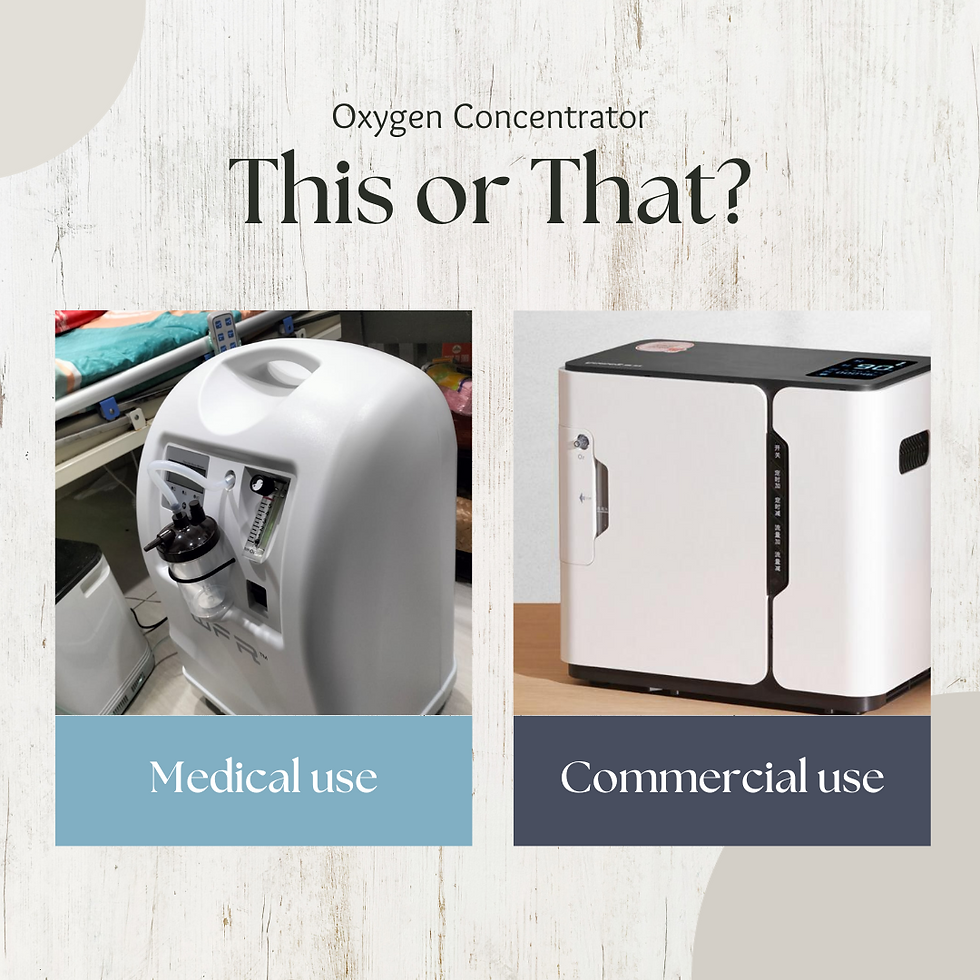Medical Grade vs Commercial Use Oxygen Concentrators, Whats the Different?
- tanchanwei27
- Jan 9, 2024
- 2 min read
Recently, we assisted a client in replacing their home oxygen concentrator.
They purchased it at first when the elderly were discharged from the hospital with oxygen supply prescribed by the doctor. After searching online, they ordered a seemingly sleek and stylish oxygen concentrator. However, after using it for a week, they noticed that the elderly family member's response to oxygen was different from when they were in the hospital.
Today, let's dive into a conversation that might not be the most glamorous, but it's undoubtedly crucial. We are going to explore the key differences between medical-grade and commercial-use oxygen concentrators.

1. Requirement
What do you need?
If you or a loved one is facing a health challenge that requires a boost of oxygen, a medical-grade concentrator is what the doctor ordered. These are made to meet strict medical standards and ensure that the oxygen is >90% no matter what is the outflow rate (which normally being indicated as Litres Per Minute, LPM).
If you are in a different need, say working in the office and need “extra” oxygen to keep yourself awake, or some power naps, a commercial-use concentrator might be more your speed. There aren’t regulated for medical use, sometimes, you will realize the oxygen purity varying based on the power setting. For example:
1LPM - Oxygen concentration 90%
3LPM - Oxygen concentration 80%
5LPM - Oxygen concentration 70%

2. Usage
Medical-grade concentrators are intended for patients dealing with respiratory conditions, such as heart diseases, lung infections, cancer, or other disorders requiring supplemental oxygen. They are suitable for home use, hospitals, clinics, and other healthcare facilities.
Commercial-use concentrators are best suited for non-medical applications. These devices are commonly found in environments where oxygen is needed for a specific process. It is important to note that using a commercial concentrator for medical purposes is not recommended due to potential differences in purity and safety standards.

3. Pros and Cons:
Medical Grade Oxygen Concentrator:
Pros:
Regulated for medical use, meeting safety and purity standards.
Designed for patient comfort with features like quiet operation and portability.
Prescribed based on individual patient needs.
Cons:
Generally more expensive due to medical-grade specifications.
Commercial Use Oxygen Concentrator:
Pros:
Cost-effective for non-medical applications.
Cons:
Not regulated for medical use, may have concerns on the purity of oxygen purity delivered
Unsuitable for medical conditions requiring precise oxygen delivery
In a nutshell, choosing between medical-grade and commercial-use oxygen concentrator involves careful consideration of the specific requirements and use cases. It is imperative to consult with healthcare professionals before making a decision to ensure the selected device aligns with the intended purpose and meets regulatory standards for safe and effective use
Article By: Pharmacist Tan Chan Wei
We will share with you more Tips of Caring for your Bedridden Loved One from time to time, follow our Facebook page: https://www.facebook.com/RemedsCo and you will not miss our article updates.
Remeds Homecare provides post-discharge care for the elderly including hospital bed rental, and doorstep services such as home nursing, home physiotherapy and caregiving services, available in all locations in Penang island and mainland, Kulim and Sungai Petani and Johor Bahru.

Remeds Homecare
Contact us for more info : 010-8823994
WhatsApp : https://wa.link/dv8uoz





Comments